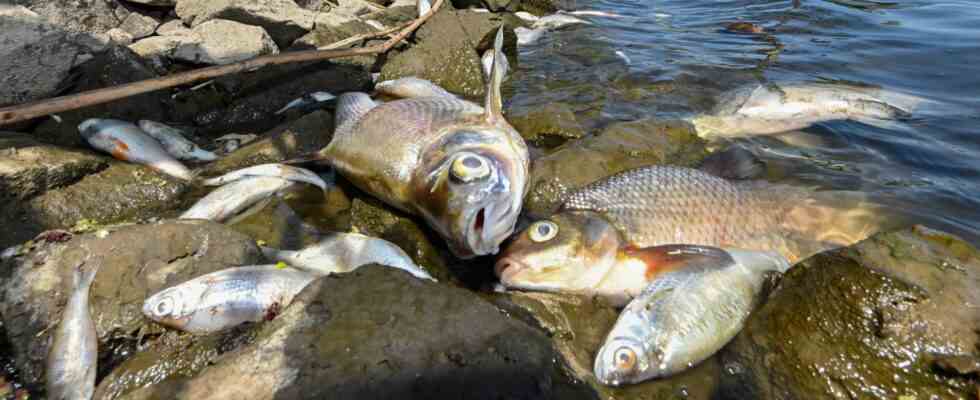Status: 08/13/2022 10:50 a.m
It is still not clear why so many fish died in the Oder. Brandenburg’s Environment Minister Vogel explained that it could also be due to greatly increased salt levels. The population should avoid the water.
The investigations into the clarification of the massive fish deaths in the Oder on the border with Poland are ongoing. Previous laboratory analyzes did not bring any precise information about the pollution of the water and the causes.
Now there is a new clue: According to the Brandenburg Environment Minister Axel Vogel, the Oder has “very much increased salt loads”. That was “absolutely atypical,” said the Green politician rbb.
Probably several factors
Vogel’s ministry has meanwhile said that the measured salt loads could be related to the fish kill. “According to current knowledge, however, it will not be a single factor that caused the fish kill in the Oder,” said in a statement.
The term salt loads refers to salts dissolved in the water. The ministry explained in the evening that these are the first further results from the Berlin-Brandenburg state laboratory for the daily samples that were taken at the automatic measuring station in Frankfurt (Oder) by Friday. The results are “not yet fully meaningful and not conclusive”.
Lab results likely to be available next week
Further investigation data “in particular on heavy metals, mercury (in other samples) and other elements” are still being clarified in the laboratory and should be available in the coming week. “Today’s data point to multi-causal relationships, which include the current very low discharge rates and high water temperatures.” With a view to possibly increased mercury levels, Vogel said that this would be checked further. It could be a local phenomenon.
When asked whether groundwater or drinking water could be contaminated, the minister replied: “We hope not.” In any case, it was “a deadly cargo” that was transported in the river. But he would not go so far as to see the groundwater resources in danger.
Dead fish swim in the Oder. They should be collected over the weekend.
Image: dpa
Lemke exchanges ideas with the Polish Environment Minister
Meanwhile, Federal Environment Minister Steffi Lemke (Greens) exchanged views with her Polish counterpart. Lemke wrote on Twitter: “The priority is now to limit damage, protect the population and identify the cause and the potential perpetrator(s).”
Personal consequences in Poland
Dealing with the fish kill triggered personnel consequences in Poland. Prime Minister Mateusz Morawiecki dismissed two top officials because they are said to have reacted too slowly to the death of fish in the Oder. The head of the water authority and the head of the environmental authority would have to vacate their offices with immediate effect, Morawiecki wrote on Friday via the short message service Twitter. “I share the fears and outrage at the poisoning of the Oder. This situation could not have been foreseen in any way, but the responsible authorities should have reacted more quickly.”
Poland did not stick to the reporting chain
In Germany, the federal and state governments had previously criticized Poland for not providing information in good time and not following the usual reporting chain for such events. According to Poland’s Prime Minister Mateusz Morawiecki, the fish kill was apparently caused by the introduction of chemical waste. “It is likely that a huge amount of chemical waste was dumped into the river, and with full knowledge of the risks and consequences,” Morawiecki said in a video message published on Facebook.
Avoid contact with Oder water
On Friday, among other things, many dead animals could still be seen on the bank in the Lower Oder Valley National Park in north-eastern Brandenburg, others were floating in the middle of the river. They should be collected over the weekend. Environmental politicians and conservationists rated the fish kill as an environmental catastrophe – and fear far-reaching consequences for the habitat of many species.
The population is also called upon to avoid any contact with water. So far, these have been more in the nature of recommendations. The city of Frankfurt an der Oder announced in the evening that it had now issued bans – for example for swimming and fishing. It can be assumed that contact with water from the Oder is dangerous for humans and animals, it said.

